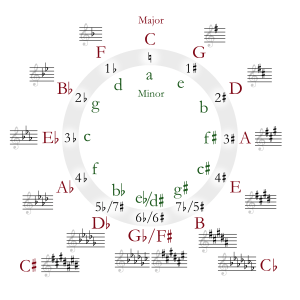A major facts for kids
 |
||
| Relative key | F♯ minor | |
|---|---|---|
| Parallel key | A minor | |
| Notes in this scale | ||
| A, B, C♯, D, E, F♯, G♯, A | ||
A major is a major scale that starts on the note A. Think of it as a musical ladder where the first step is A. Its key signature has three sharps. This means that three notes in the scale are played a little higher than usual.
The key of A major is often described as bright and clear. Its relative minor is F-sharp minor. This means F-sharp minor uses the same notes as A major, but it starts on F-sharp and has a different feel.
Contents
A Major in Classical Music
Many famous composers have written music in A major. While not as common as keys like D major or G major, A major has a special place.
Symphonies in A Major
Some important symphonies in A major include:
- Beethoven's Symphony No. 7.
- Bruckner's Symphony No. 6.
- Mendelssohn's Symphony No. 4.
These pieces are from the Romantic era of music.
Mozart and the Clarinet
Mozart especially liked using A major for his clarinet music. His famous Clarinet Concerto and Clarinet Quintet are both in this key. Mozart often wrote for clarinets that were tuned to play well in A major.
Chamber Music Pieces
A major is also very popular in chamber music. Chamber music is played by a small group of instruments, usually in a smaller room.
- Johannes Brahms wrote a violin sonata in A major.
- César Franck also composed a well-known violin sonata in A major.
- Gabriel Fauré wrote a violin sonata in A major too.
Violinist Peter Cropper once said that A major "is the fullest sounding key for the violin." He was talking about Beethoven's Kreutzer Sonata, which is also in A major.
The Mood of A Major
A German musician named Christian Friedrich Daniel Schubart wrote about the feelings that different keys create. He believed that A major is good for "declarations of innocent love." He also thought it expressed "hope of seeing one's beloved again when parting." Schubart felt it showed "youthful cheerfulness and trust in God."
Timpani in A Major Music
When an orchestra plays music in A major, the timpani (kettledrums) are usually tuned in a special way. They are set to the notes A and E. These two notes are a fifth apart. In most other musical keys, timpani are usually tuned a fourth apart. This unique tuning helps the timpani sound just right for A major pieces.
Scales and keys
| Diatonic Scales and Keys | |||||||||||||||||||||||||||||||||||||||||||||||||||||||
|---|---|---|---|---|---|---|---|---|---|---|---|---|---|---|---|---|---|---|---|---|---|---|---|---|---|---|---|---|---|---|---|---|---|---|---|---|---|---|---|---|---|---|---|---|---|---|---|---|---|---|---|---|---|---|---|
|
|||||||||||||||||||||||||||||||||||||||||||||||||||||||
| The table shows the number of sharps or flats in each scale. Minor scales are written in lower case. | |||||||||||||||||||||||||||||||||||||||||||||||||||||||
See also
 In Spanish: La mayor para niños
In Spanish: La mayor para niños
 | William M. Jackson |
 | Juan E. Gilbert |
 | Neil deGrasse Tyson |


